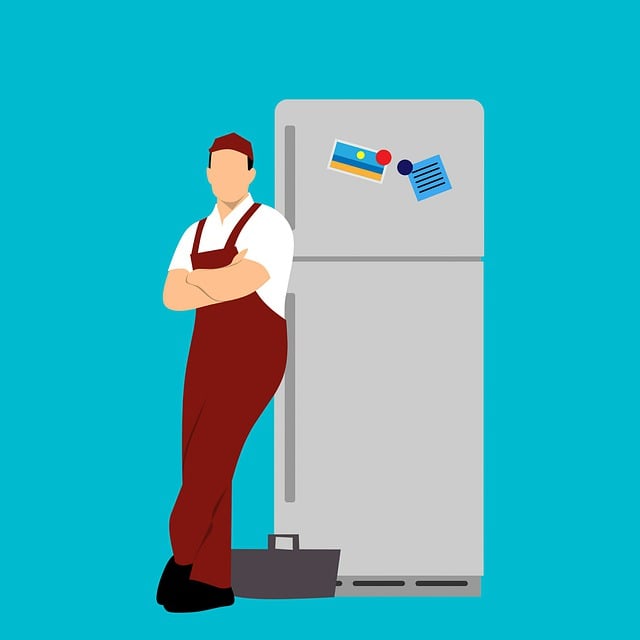In case of a refrigerator emergency, it's essential to act swiftly to ensure food safety and prevent spoilage. If your fridge isn't cooling properly, start by checking the power supply, including the circuit breaker, and adjust the thermostat settings for both the refrigerator and freezer compartments. Clean the condenser coils of any dust or debris using a vacuum with a brush attachment to enhance cooling efficiency. For water leaks, clear the defrost drain if clogged or repair compromised door seals to maintain integrity. Should the unit make abnormal sounds upon operation, consult the user manual for model-specific advice, and consider that persistent issues or compressor problems may necessitate professional refrigerator repair services due to their high voltage nature and potential safety risks. Always adhere to manufacturer guidelines during DIY repairs, and know when to call in a qualified technician for complex issues beyond your expertise. Professional emergency refrigerator repair is crucial not just for the appliance's functionality but also for the health and safety of your food storage. Regular maintenance and prompt action can extend the life of your refrigerator and reduce the likelihood of future emergencies.
When your refrigerator suddenly stops working, the urgency of the situation is clear. Perishable food items at risk, immediate action is crucial to prevent spoilage and maintain food safety. This article provides a comprehensive guide on how to tackle common fridge malfunctions through emergency refrigerator repair techniques. Whether you’re navigating through a power supply issue or dealing with a faulty thermostat, our step-by-step DIY tips are designed to help you resolve the problem swiftly. However, if your attempts at repair prove unsuccessful, recognizing when to call in professional emergency refrigerator repair services is essential to safeguard your food and home. Understanding the intricacies of refrigerator repair can make the difference between a temporary fix and a long-term solution.
- Immediate Action: Assessing and Troubleshooting Common Fridge Malfunctions
- Step-by-Step Guide to DIY Emergency Refrigerator Repairs for Urgent Situations
- When DIY Fails: Identifying the Need for Professional Emergency Refrigerator Repair Services
Immediate Action: Assessing and Troubleshooting Common Fridge Malfunctions

When your refrigerator malfunctions in an emergency situation, swift action is crucial to protect perishable items and maintain food safety. The first step in emergency refrigerator repair is to assess the issue at hand. Check if the fridge is plugged in and whether the power supply to the unit is functioning correctly. If the fridge is not powered on, resolve this before moving forward. Next, ensure that the thermostat is set properly and that the vents are unobstructed to allow for optimal airflow.
In case the refrigerator is powered but not cooling effectively, inspect the coils for any dirt or debris that may impede heat exchange. Clean the coils thoroughly if necessary. Additionally, verify that the door seals are intact and tight; a compromised seal can lead to warm air infiltration, disrupting the cooling process. If the refrigerator is making unusual sounds or displaying error codes, refer to the user manual for troubleshooting steps specific to your model. In urgent situations where professional repair is the only option, seek out reputable refrigerator repair services promptly to prevent food spoilage and further damage to the appliance. It’s always advisable to handle such repairs with care to avoid potential hazards and ensure the longevity of your refrigerator.
Step-by-Step Guide to DIY Emergency Refrigerator Repairs for Urgent Situations

When your refrigerator malfunctions, especially in an emergency situation, immediate action is necessary to prevent food spoilage and potential waste. A DIY emergency repair can be a cost-effective solution if you have basic troubleshooting skills and tools at hand. If the refrigerator isn’t cooling properly, start by checking the power supply and ensuring the unit is plugged in and the circuit breaker hasn’t tripped. Next, inspect the thermostat settings to confirm they are set correctly for both the fridge and freezer compartments. Should the problem persist, examine the condenser coils for any accumulation of dust or debris that may impede efficient operation. Use a vacuum cleaner with a brush attachment to gently remove any blockages, being careful not to bend or damage the coils. If the refrigerator is leaking water, identify the source of the leak. It could be a defrost drain clogged with ice or a damaged door seal allowing moisture to enter. Clear the drain by carefully melting the ice with warm water, ensuring not to overheat and damage any components. Should the door seal be at fault, clean it thoroughly with soapy water and a soft cloth, reattaching it securely if it’s come loose. In cases where the refrigerator is making unusual noises, such as grinding or hissing sounds, switch off the unit and leave it to cool before inspecting for loose or damaged fan blades or compressor issues. If you suspect a compressor malfunction, safety precautions dictate that professional assistance is required due to the high voltage components involved.
For refrigerators not cooling adequately, check the temperature settings first. If they are correct and the issue continues, investigate the condenser fan operation. A faulty or obstructed fan can significantly impact cooling efficiency. Ensure the fan blades are clean and that the motor is functioning properly. If the motor has failed, it will need to be replaced by a part with the same specifications as the original. Always adhere to manufacturer instructions when handling refrigerator components, and if at any point you feel the repair goes beyond your expertise, contact a professional technician for assistance. Remember to prioritize safety first; handle electrical components with care, and always unplug the unit before attempting any repair that involves physical manipulation of internal parts.
When DIY Fails: Identifying the Need for Professional Emergency Refrigerator Repair Services

When a refrigerator malfunctions in an emergency situation, immediate action is critical to prevent food spoilage and maintain hygiene. While some issues may seem like simple fixes for those with DIY expertise, it’s crucial to recognize the limits of self-repair, especially when dealing with complex appliance systems. Common symptoms suggesting professional intervention include a refrigerator that won’t start, is running continuously without reaching the set temperature, or has developed an unusual sound or odor. These signs often indicate deeper problems such as electrical issues, faulty thermostats, or compressor malfunctions, which can be hazardous to address without proper training and tools. In such instances, opting for professional emergency refrigerator repair services is not just a matter of convenience but a necessity to avoid further complications or potential safety risks. Professionals have the expertise and equipment to accurately diagnose and effectively resolve these issues swiftly, ensuring your refrigerator operates safely and efficiently. Their prompt response can be the difference between preserving perishables and facing costly replacements or health hazards due to spoiled food.
In urgent situations where your refrigerator malfunctions, swift action is crucial to protect your perishables. This article has outlined immediate steps for assessing and troubleshooting common fridge issues, providing a comprehensive DIY guide for emergency refrigerator repairs in critical circumstances. While many problems can be resolved with the guidance offered, there are instances when professional repair services are necessary. For those facing unexpected refrigerator breakdowns, understanding the basic repair principles and knowing when to call for expert assistance is key to maintaining food safety and preventing further complications. Remember, the goal is to ensure your refrigerator operates efficiently and effectively, preserving your groceries and peace of mind. Refrigerator Repair expertise, whether self-managed or professional, is an essential skill in safeguarding against food spoilage and costly repairs.
